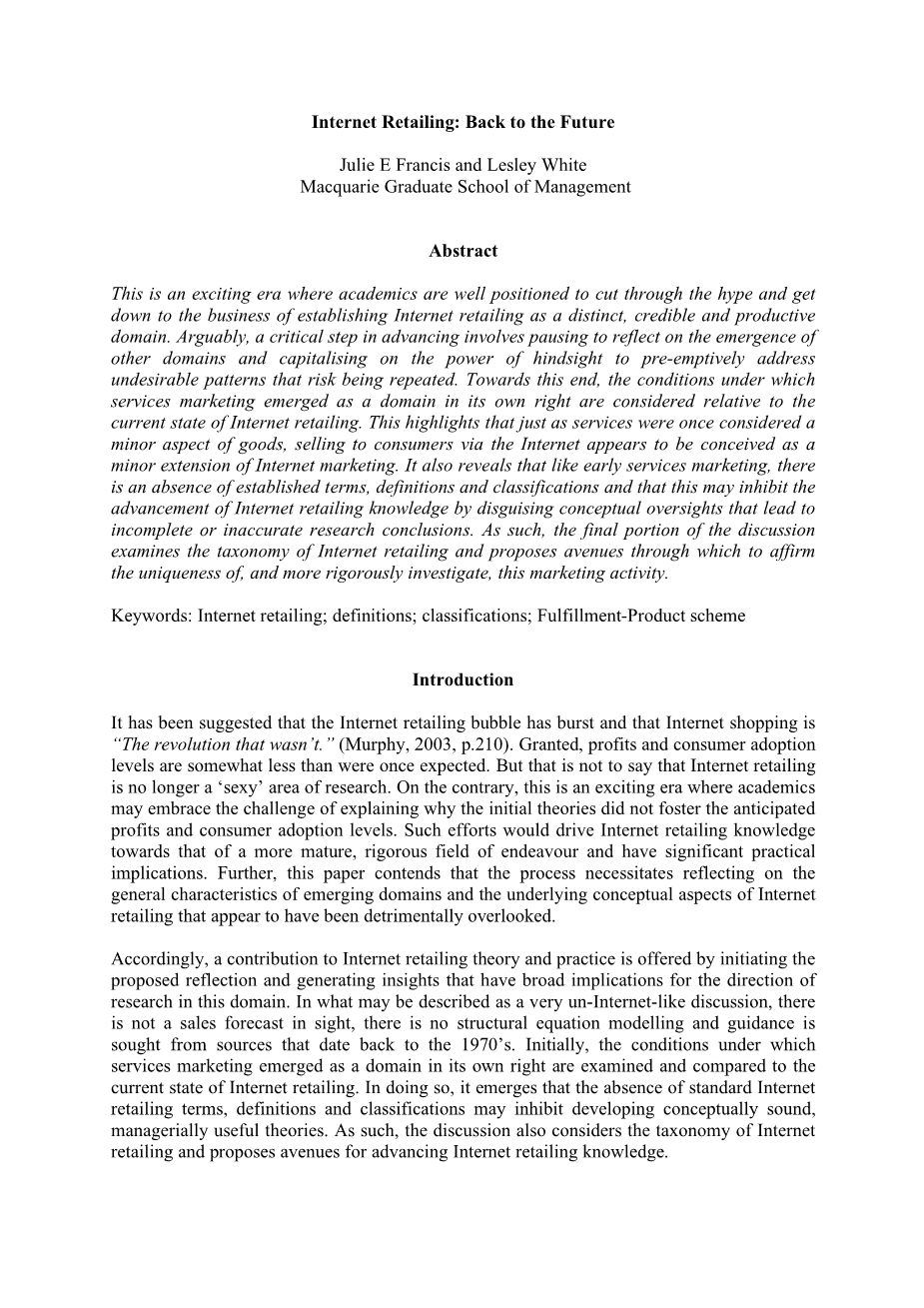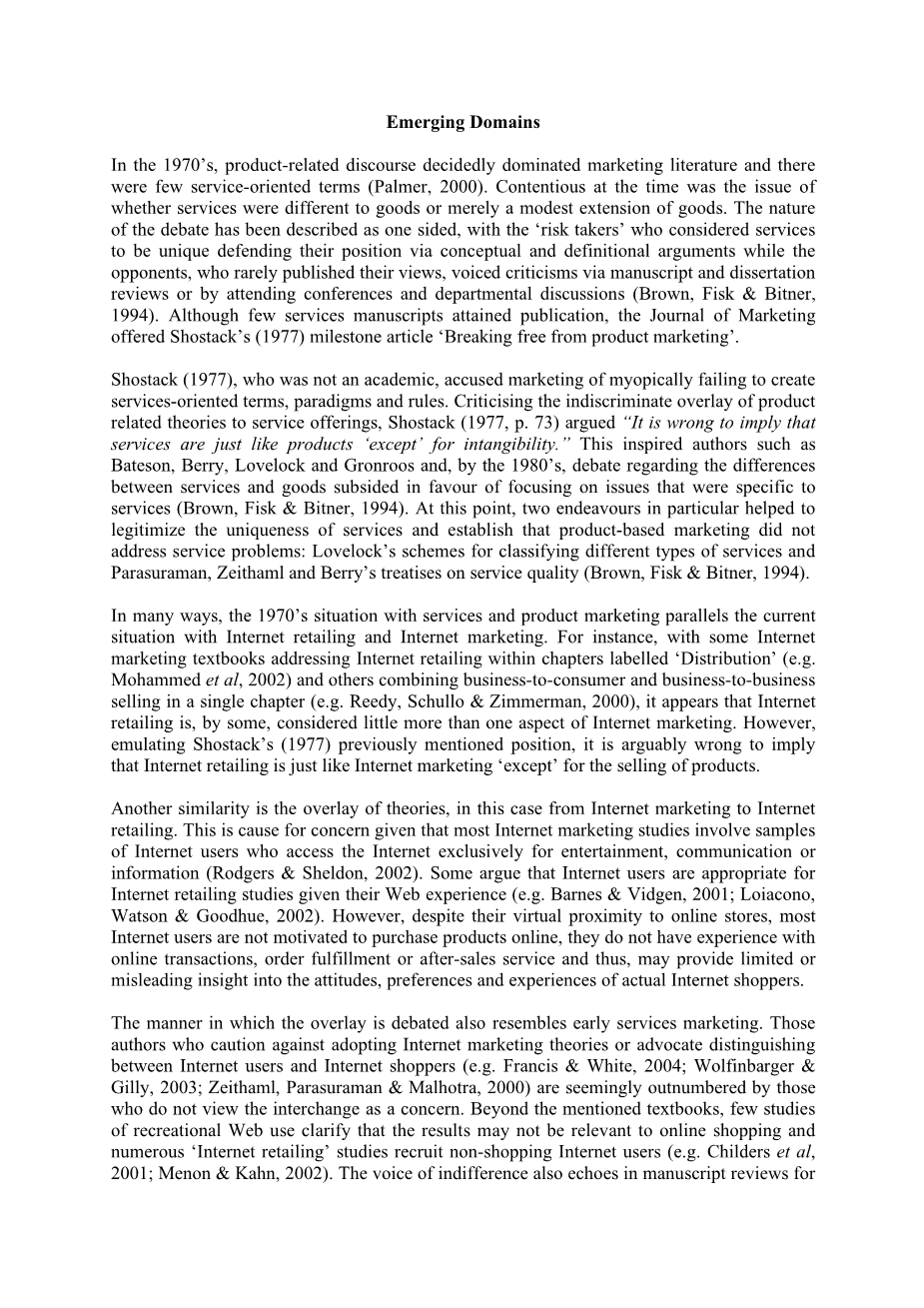

英语原文共 7 页,剩余内容已隐藏,支付完成后下载完整资料
附录A 译文
互联网零售
这是一个令人兴奋的时代,在这个时代,学术界处于有利的地位,进而把建立互联网零售业作为一个独特、可信和富有成果的领域,使其可以摆脱促销广告方式。可以说,演变过程中的一个关键步骤是暂停思考其他领域的出现,并利用事后发现的能力,先发制人地解决那些有风险并不断重复的营销模式。以此为目的,服务营销本身作为一个领域出现的条件,它被认为是相对于互联网零售的现状而言的。这突出表明,正如服务曾经被认为是商品的一个次要方面一样,通过互联网向消费者销售似乎被认为是互联网营销的一个次要延伸。它还揭示出,就像早期的服务营销一样没有既定的条款,这可能会导致研究结论产生不完整和不准确的概念,从而阻碍了互联网零售知识的发展。因此,文章的最后一部分说明了互联网零售的分类,并提出了更严格调查确认这种营销活动的独特性。
有人认为,互联网零售泡沫已经破裂,而网络购物是“一场不可能的革命”。(Murphy,2003年,第210页)。因为,销售利润和消费者的收入水平要比以前预期的要低一些。但这并不是说互联网零售不再是一个“时尚”的研究领域。相反,这是一个令人兴奋的时代,学者们可能会接受挑战,解释为什么最初的理论没有促进预期利润上升和消费者的购买水平。这些努力将推动互联网零售知识走向更加成熟和严格的领域,并且具有重大的实际影响力。此外,本文还认为,在这一过程中需要反思新领域的一般特征和互联网零售业潜在的概念方面,这些方面都被我们忽视了。因此,提出了对网络零售理论和实践的思考,并提出了对这一领域的研究方向具有广泛影响的见解,从而为网络零售理论和实践做出了贡献。在一个没有互联网想象的讨论中,没有销售方式的预测,没有结构方程建模,也没有从20世纪70年代的数据来源来寻求指导。最初,对服务营销作为一个领域出现的条件进行了调查,并将其与互联网零售的现状进行了比较。在这种情况下,由于缺乏标准的互联网零售术语、定义和分类,也许会阻碍概念上的健全、管理上有用理论的发展。因此,本文还对网络零售的分类进行了探讨,并提出了提高互联网零售知识的途径。
除相似之处外,服务营销和互联网零售的情况也显示出显著的差异性。例如,早期的服务营销作者将关注的重点在于概念问题、分类方案和质量检查。然而,在互联网零售业中,电子商务技术的发展和应用已经超过了对概念问题的关注,现在的学者称之为互联网零售。没有标准名称或定义,互联网零售商主要被视为一个统一的公司,虽然公司和购物程序之间存在差异。但是关于互联网零售的学习,很少有研究者超越了对网站的认知和实践。因此,需要把商品和服务的销售和交换放在零售业的次要方面。总的来说,互联网零售似乎是互联网营销。对早期的服务营销进行可比性的思考认为这是不恰当的,可能会阻碍网络零售理论的发展和实践基础。然而,回顾以前的资料表明,研究一条有意义的前进道路可能是通过关注概念性问题、术语和分类来铺垫,以及互联网零售业的关键要素。进而,下面将对文献中使用的各种标签、定义和分类。
因此,建议将互联网零售定义为通过互联网直接向最终消费者销售商品或服务以供其个人、非商业使用的所有活动。由此,可以看出虽然广告与零售有关,但单靠广告并不构成零售,因此,仅通过网络传播的活动也不构成网络零售。相反,要符合互联网零售的条件,互联网必须作为向消费者销售的渠道。该定义还重申了,有形商品和服务产品的在线销售与该领域相关。
没有考虑到顾客,讨论互联网零的定义是不完整的。根据互联网零售的定义,实际客户可以被描述为在互联网上为个人、非商业目的购买商品或服务的人。Donthu和Garcia(1999)在将未进行在线购买的互联网用户标识为“互联网非购物者”之前,将该互联网用户标记为“互联网购物者”。如前所述,在招募样本或从他人的工作中见解时,应当对研究参与者的在线购买体验进行更详细的审查。诚然,实际的互联网购物者形成了一个小的群体,识别会员制度的确是一个挑战。尽管如此,研究惯例要求参与者对所调查的主题有适当的了解,以免提供不准确或误导性的信息(Bryman,1989年)。
值得说明的是,本文不是在说明网络营销理论没有任何意义。然而,有人认为,知识的进步可能取决于突破。通过关注概念的问题、类别和质量,使网络零售的独特性,就像在服务营销中所做的那样。例如,对正在调查的互联网零售类别进行了细化或强调存在不同的采购和收购程序,将提高理论价值和管理效用。研究结论虽然重申了互联网的营销理论和不购物的互联网用户,这些没有充分解决互联网零售方面的问题。要实现这些目标,要有许多方面的调查。特别是有益的地方,它包括为每个产品的类别、开发质量、概念模型,比较不同形式下网上购物的网购动机和偏好,或制定特定类别的战略目标和挑战。这样的调查将解决互联网零售知识上的显著差距,产生的理论基础,帮助企业管理者达到更理想的盈利水平和客户忠诚度,同时也为检验特定领域的研究问题提供了基础。因此,将互联网零售业塑造成一个独特、可信、高效的领域不仅是必要的,而且它也为人们提供了一系列有趣的研究机会。
附录A 外文原文
Internet Retailing: Back to the Future
This is an exciting era where academics are well positioned to cut through the hype and get down to the business of establishing Internet retailing as a distinct, credible and productive domain. Arguably, a critical step in advancing involves pausing to reflect on the emergence of other domains and capitalising on the power of hindsight to pre-emptively address undesirable patterns that risk being repeated. Towards this end, the conditions under which services marketing emerged as a domain in its own right are considered relative to the current state of Internet retailing. This highlights that just as services were once considered a minor aspect of goods, selling to consumers via the Internet appears to be conceived as a minor extension of Internet marketing. It also reveals that like early services marketing, there is an absence of established terms, definitions and classifications and that this may inhibit the advancement of Internet retailing knowledge by disguising conceptual oversights that lead to incomplete or inaccurate research conclusions. As such, the final portion of the discussion examines the taxonomy of Internet retailing and proposes avenues through which to affirm the uniqueness of, and more rigorously investigate, this marketing activity.
It has been suggested that the Internet retailing bubble has burst and that Internet shopping is ”The revolution that wasnrsquo;t.” (Murphy, 2003, p.210). Granted, profits and consumer adoption levels are somewhat less than were once expected. But that is not to say that Internet retailing is no longer a lsquo;sexyrsquo; area of research. On the contrary, this is an exciting era where academics may embrace the challenge of explaining why the initial theories did not foster the anticipated profits and consumer adoption levels. Such efforts would drive Internet retailing knowledge towards that of a more mature, rigorous field of endeavour and have significant practical implications. Further, this paper contends that the process necessitates reflecting on the general characteristics of emerging domains and the underlying conceptual aspects of Internet retailing that appear to have been detrimentally overlooked.Accordingly, a contribution to Internet retailing theory and practice is offered by initiating the proposed reflection and generating insights that have broad implications for the direction of research in this domain. In what may be described as a very un-Internet-like discussion, there is not a sales forecast in sight, there is no structural equation modelling and guidance is sought from sources that date back to the 1970rsquo;s. Initially, the conditions under which services marketing emerged as a domain in its own right are examined and compared to the current state of Internet retailing. In doing so, it emerges that the absence of standard Internet retailing terms, definitions and classifications inhibit developing conceptually sound,managerially useful theories. As such, the discussion also considers the taxonomy of Internet retailing and proposes avenues for advancing Internet retailing knowledge.
Similarities aside, the services marketing and Internet retailing situations display notable differences. For instance, early services marketing authors legitimized the uniqueness of the domain by focusing on conceptual issues, classification schemes and examinations of quality. In Internet retailing however, the development and application of e-commerce technology has outpaced attention to conceptual matters, what the current authors refer to as Internet retailing does not have a standard name or definition and Internet retailers are predominantly treated as a uniform group despite the
剩余内容已隐藏,支付完成后下载完整资料
资料编号:[445550],资料为PDF文档或Word文档,PDF文档可免费转换为Word
以上是毕业论文外文翻译,课题毕业论文、任务书、文献综述、开题报告、程序设计、图纸设计等资料可联系客服协助查找。


